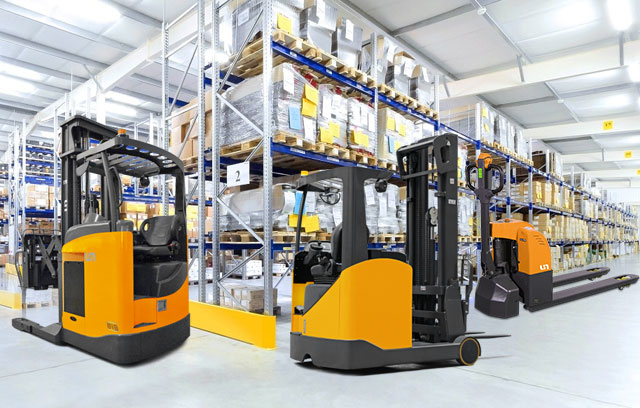Electric, gas-powered, and diesel-powered forklift trucks each have their own advantages and disadvantages, depending on factors such as application requirements, operating conditions, and environmental considerations. Here's a comparison of the three types:
Electric Forklift Trucks:
Advantages:
Environmentally friendly: Electric forklifts produce zero emissions during operation, making them ideal for indoor use and environments where emissions must be minimized.
Lower operating costs: Electric forklifts typically have lower fuel and maintenance costs compared to internal combustion (IC) forklifts, as they have fewer moving parts and require less frequent servicing.
Quieter operation: Electric forklifts operate more quietly than IC forklifts, which can be advantageous in noise-sensitive environments such as warehouses or distribution centers.
Greater maneuverability: Electric forklifts are often more maneuverable than IC forklifts, thanks to their compact size and precise control systems.
Disadvantages:
Limited runtime: Electric forklifts rely on battery power, which requires periodic recharging. This limits their runtime compared to IC forklifts, especially in multi-shift operations.
Longer recharge times: Charging electric forklift batteries can take several hours, which may require downtime for recharging or the need for multiple battery packs for continuous operation.
Initial cost: Electric forklifts tend to have a higher upfront cost compared to IC forklifts, primarily due to the cost of batteries and charging infrastructure.
Limited outdoor use: Electric forklifts may not be suitable for outdoor use in inclement weather or rough terrain conditions due to the risk of water damage to electrical components and reduced traction.
Gas-Powered (Propane) Forklift Trucks:
Advantages:
Versatility: Gas-powered forklifts can be used both indoors and outdoors, providing flexibility for a wide range of applications and operating environments.
Fast refueling: Propane tanks can be quickly refilled or exchanged, allowing for minimal downtime compared to electric forklifts that require longer recharge times.
Powerful performance: Gas-powered forklifts typically offer high torque and horsepower, making them suitable for heavy-duty lifting and demanding applications.
Cost-effective fuel: Propane is often more cost-effective than diesel or gasoline, offering potential fuel savings over the long term.
Disadvantages:
Emissions: Gas-powered forklifts produce emissions during operation, including carbon monoxide and nitrogen oxides, which may require ventilation in indoor environments to maintain air quality.
Fuel storage: Propane tanks require dedicated storage space and safety precautions for handling and refueling, which may be a consideration for some facilities.
Noise level: Gas-powered forklifts tend to be louder than electric forklifts, which may be a concern in noise-sensitive environments.
Maintenance requirements: Gas-powered forklifts require regular maintenance of the engine, fuel system, and exhaust system, which can increase operating costs compared to electric forklifts.
Diesel-Powered Forklift Trucks:
Advantages:
High performance: Diesel-powered forklifts offer high torque and horsepower, making them suitable for heavy-duty lifting and outdoor applications in rough terrain.
Long runtime: Diesel forklifts have a longer runtime compared to electric forklifts, as they can be refueled quickly and have larger fuel tanks.
Fuel availability: Diesel fuel is widely available and can be stored for long periods without degradation, providing greater convenience for refueling.
Durability: Diesel engines are known for their durability and reliability, making diesel forklifts well-suited for demanding industrial environments.
Disadvantages:
Emissions: Diesel-powered forklifts produce emissions during operation, including particulate matter and nitrogen oxides, which may require ventilation and emission controls in indoor environments.
Higher fuel costs: Diesel fuel tends to be more expensive than propane, and diesel forklifts typically have higher fuel consumption rates compared to propane or electric forklifts.
Noise and vibration: Diesel engines are typically louder and produce more vibration than electric or gas-powered engines, which may affect operator comfort and contribute to noise pollution.
Maintenance complexity: Diesel engines require regular maintenance, including oil changes, filter replacements, and emissions system inspections, which can increase operating costs and downtime.











 中文简体
中文简体 عربى
عربى Español
Español














